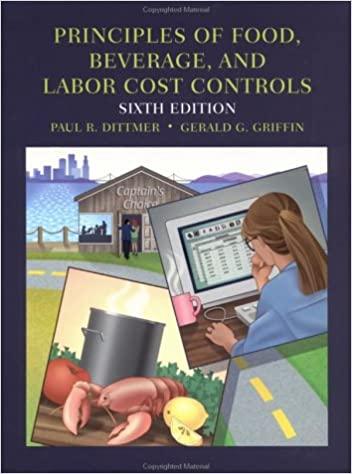Colonial Cookies, Inc., bakes cookies for retail stores. The companys best-selling cookie is chocolate nut supreme which is marketed as a gourmet cookie and regularly
| Colonial Cookies, Inc., bakes cookies for retail stores. The companys best-selling cookie is chocolate nut supreme which is marketed as a gourmet cookie and regularly sells for $9.00 per pound. The standard cost per pound of chocolate nut supreme, based on Colonials normal monthly production of 380,000 pounds, is as follows: |
| Cost Item | Quantity | Standard Unit Cost | Total Cost | ||||||
| Direct materials: | |||||||||
| Cookie mix | 10 | oz. | $ | .02 | per oz. | $ | .20 | ||
| Milk chocolate | 5 | oz. | .15 | per oz. | .75 | ||||
| Almonds | 1 | oz. | .50 | per oz. | .50 | ||||
| $ | 1.45 | ||||||||
| Direct labor:* | |||||||||
| Mixing | 1 | min. | 14.40 | per hr. | $ | .24 | |||
| Baking | 2 | min. | 18.00 | per hr. | .60 | ||||
| $ | .84 | ||||||||
| Variable overhead | 3 | min. | 32.40 | per direct-labor hr. | $ | 1.62 | |||
| Total standard cost per pound | $ | 3.91 | |||||||
| *Direct-labor rates include employee benefits. |
| Applied on the basis of direct-labor hours. |
| Colonials management accountant, Karen Blair, prepares monthly budget reports based on these standard costs. Februarys contribution report, which compares budgeted and actual performance, is shown in the following schedule. |
| Contribution Report for February | |||||||||
| Static Budget | Actual | Variance | |||||||
| Units (in pounds) | 380,000 | 405,000 | 25,000 | F | |||||
| Revenue | $ | 3,420,000 | $ | 3,604,500 | $ | 184,500 | F | ||
| Direct material | $ | 551,000 | $ | 774,500 | $ | 223,500 | U | ||
| Direct labor | 319,200 | 313,320 | 5,880 | F | |||||
| Variable overhead | 615,600 | 760,445 | 144,845 | U | |||||
| Total variable costs | $ | 1,485,800 | $ | 1,848,265 | $ | 362,465 | U | ||
| Contribution margin | $ | 1,934,200 | $ | 1,756,235 | $ | 177,965 | U | ||
| Justine Madison, president of the company, is disappointed with the results. Despite a sizable increase in the number of cookies sold, the products expected contribution to the overall profitability of the firm decreased. Madison has asked Blair to identify the reason why the contribution margin decreased. Blair has gathered the following information to help in her analysis of the decrease. |
| Usage Report for February | ||||||
| Cost Item | Quantity | Actual Cost | ||||
| Direct materials: | ||||||
| Cookie mix | 4,125,000 | oz. | $ | 82,500 | ||
| Milk chocolate | 2,410,000 | oz. | 482,000 | |||
| Almonds | 420,000 | oz. | 210,000 | |||
| Direct labor: | ||||||
| Mixing | 405,000 | min. | 97,200 | |||
| Baking | 720,400 | min. | 216,120 | |||
| Variable overhead | 760,445 | |||||
| Total variable costs | $ | 1,848,265 | ||||
rev: 10_07_2015_QC_CS-27359, 10_08_2015_QC_CS-27359
Case 11-55 Part 1
| Required: | |
| 1. | Prepare a new contribution report for February, in which: |
| The static budget column in the contribution report is replaced with a flexible budget column. | |
| The variances in the contribution report are recomputed as the difference between the flexible budget and actual columns. 2. What is the total contribution margin in the flexible budget column 3. What is the total variance between the flexible budget contribution margin and the actual contribution margin in the new report prepared for part (1)? Calculate the total contribution margin variance by computing the following variances. (Assume that all materials are used in the month of purchase.). (Do not round your intermediate calculations. Indicate the effect of each variance by selecting "Favorable" or "Unfavorable". Select "None" and enter "0" for no effect (i.e., zero variance).) |
Step by Step Solution
There are 3 Steps involved in it
Step: 1

See step-by-step solutions with expert insights and AI powered tools for academic success
Step: 2

Step: 3

Ace Your Homework with AI
Get the answers you need in no time with our AI-driven, step-by-step assistance
Get Started


